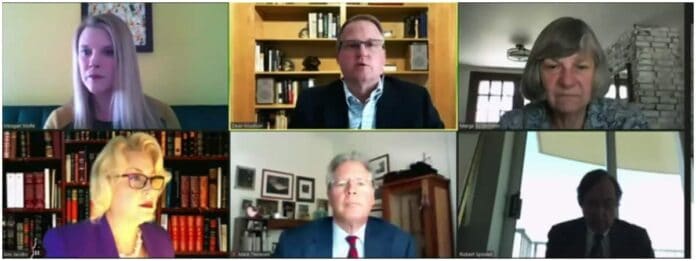Democratic legislators tried to stop the audit, while the City of Madison & Milwaukee County refused to let auditors handle ballots. No wonder.
A partisan Wisconsin Election Commission chaired by major Joe Biden donors, along with municipal clerks throughout Wisconsin, violated state law in numerous ways in the 2020 presidential election, according to a non-partisan Legislative Audit Bureau report, which was released on October 22, 2021.
The news media is spinning the audit along Democratic lines, arguing it shows there wasn’t widespread fraud. However, what it does show is how a politicized Election Commission repeatedly ignored state law and the legislative process to game the process, creating a more favorable environment for Biden, especially when it came to absentee voting. It also shows how often poorly trained municipal clerks engaged in shoddy oversight as the state’s number of absentee ballots soared in large Democratic counties.
Furthermore, non-partisan auditors received a shameful lack of cooperation along party lines. The City of Madison REFUSED to let auditors handle absentee ballots despite Dane County having the highest percentage of absentee ballots in the state. “…the City of Madison clerk declined to allow us to physically handle the certificates,” auditors noted. Three Wisconsin Election Commission members refused an invite to speak with the auditors (the audit doesn’t mention which ones, but three are Democrats). Fewer than half of the state’s municipal clerks surveyed by the auditors responded.
In the 2020 presidential election, almost 2.0 million absentee ballots were cast, 59.6 percent of all ballots cast. “Absentee ballots as a proportion of all ballots cast ranged from 74.4 percent in Dane County to 26.3 percent in Clark County,” auditors found. The auditors found that more than 7 percent of absentee ballot certificates were incomplete, in a sample studied, although most of those were for minor things like zip codes and state name. Only .02 percent of absentee ballots were rejected in the sample reviewed by auditors.
There are significant gaps in state law; for example, unlike 30 other states, Wisconsin does not require clerks to verify signatures on absentee ballots. However, auditors “found that WEC did not comply with statutes that require it to obtain from DOT the signatures of individuals who register online to vote.” Indeed, auditors repeatedly found that the WEC issued guidance that did not comply with statutes or did not include legislators.
State law requires the Wisconsin Election Commission to try to verify information provided by people who register to vote with information on vehicle registrations, driver’s licenses and state identification cards. The auditors found that the information matched in 93.8 percent of the 957,977 individuals who registered to vote from Jan. 1, 2020, through Nov. 3, 2020. That means that the information did not match for more than 57,000 voters.
President Donald Trump lost the election in Wisconsin by just over 20,000 votes.
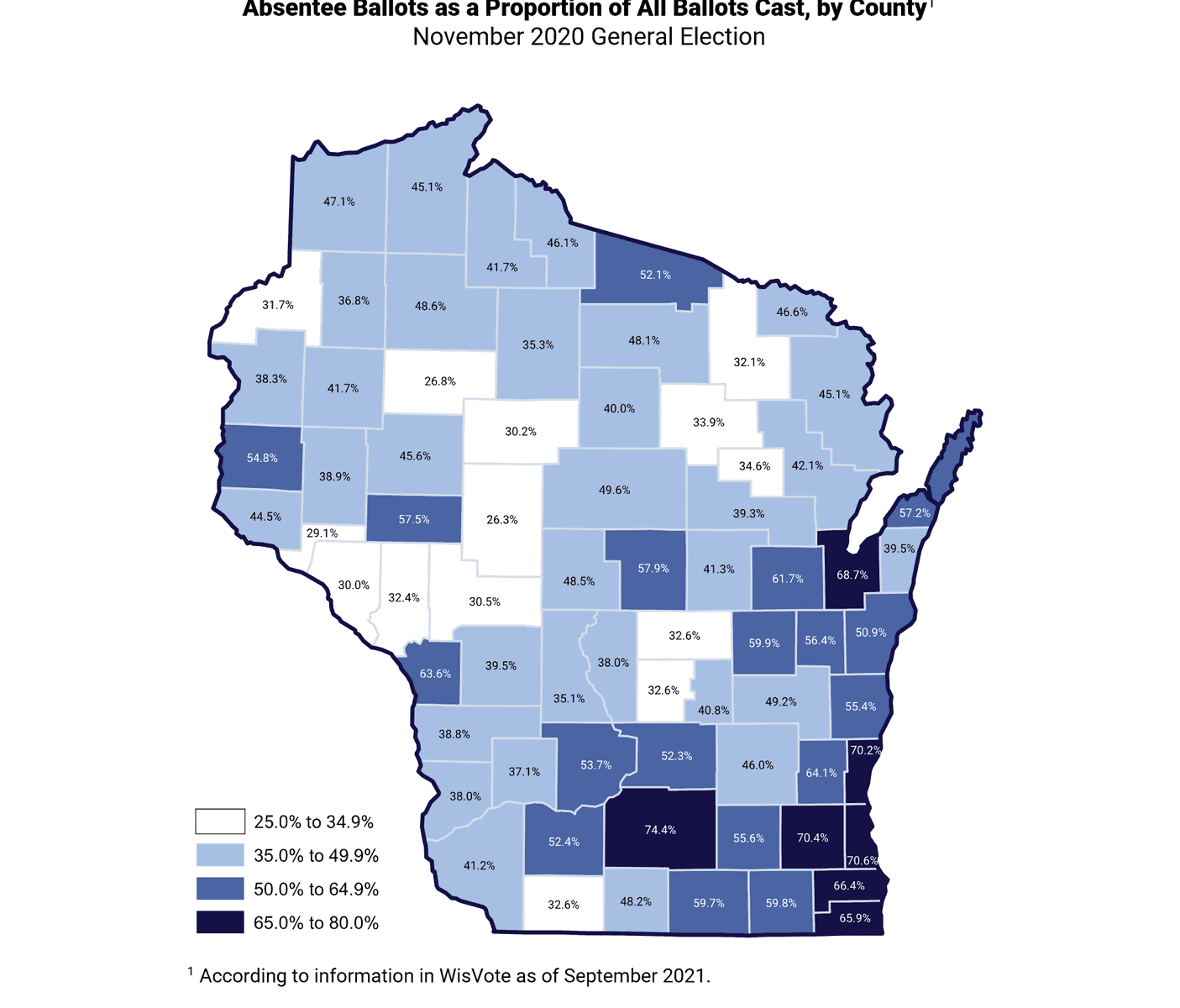
President Trump has repeatedly asserted that the election was rigged. The audit revealed sloppy (minimally) scrutiny of absentee ballot certifications amid a massive spike in Democratic County absentee balloting that far exceeded other counties, abetted by a run-amok state Election Commission dominated by Joe Biden supporting liberal partisans (Ann Jacobs, Mark Thomsen), which repeatedly acted outside the legislative process. (Before the election, we also documented how the same slippery partisans engineered keeping the Green Party and Kanye West – who would have likely siphoned votes from Biden – off the Wisconsin ballot.) The audit comes as the news media has consistently hammered former Supreme Court Justice Michael Gableman for his probe into election irregularities in the 2020 general election.

“To complete this audit, we contacted WEC’s staff, surveyed all 1,835 municipal clerks and 72 county clerks in April 2021, contacted 179 clerks to obtain additional information about elections administration issues, analyzed voter registration data, physically reviewed 14,710 certificates that accompanied absentee ballots returned to clerks in 29 municipalities throughout the state, reviewed the results of 175 statutorily required tests of electronic voting equipment that clerks in 25 municipalities completed before the November 2020 General Election, and reviewed all 45 sworn, written complaints pertaining to the General Election that were filed with WEC as of late-May 2021,” the auditors wrote.
Here are some of the key findings:
Violations of State Law by the Wisconsin Election Commission

How did the Wisconsin Election Commission, which has liberal partisan Joe Biden supporters as its chair and vice-chair, violate state law?
Here are just a couple of examples from the lengthy report:
In June 2020, during the public health emergency, the Wisconsin Election Commission issued written guidance directing clerks not to send or attempt to send special voting deputies to facilities and homes (with indefinitely confined voters), “but to instead mail absentee ballots to individuals living in these facilities and homes who requested the ballots. This guidance did not comply with statutes,” auditors wrote.
Statutes “require elections officials to count ballots without adjourning until the counting is completed. In October 2020, WEC’s staff issued written guidance indicating that although statutes do not permit adjourning while counting ballots and that clerks should complete all required tasks before adjourning on Election Night, inevitable circumstances may require adjourning until the following day. This written guidance did not comply with statutes,” auditors found.
They added, “Statutes require WEC to determine an error rate for each type of electronic voting equipment after each General Election. WEC’s staff did not report to WEC the statutorily required error rates for any electronic voting equipment used in the November 2020 General Election.”
The WEC also failed in its oversight function of the election.
State law requires the Wisconsin Election Commission to “belong to the Electronic Registration Information Center (ERIC), which is a nonprofit organization that helps member states to improve the accuracy of their voter registration systems by providing personally identifiable information on certain individuals.” Its data helps to ensure that Wisconsin’s voter registration records “are accurate and complete. From September 2016 to May 2021, WEC did not regularly obtain all five types of ERIC data. We recommend that WEC’s staff work with WEC to establish a schedule for regularly obtaining each type of ERIC data,” auditors wrote.
Unbelievably, the Wisconsin Election Commission whipped out a press release on the audit that insisted, “Overall the report made it clear that vote totals in the 2020 election were accurate, that no processes were identified that could have changed the outcome, and that no evidence of widespread fraud of any type was discovered. The LAB report instead highlighted opportunities to improve election processes and procedures, identifying several administrative issues worthy of review.”
“I am disappointed that LAB didn’t give us a chance to review a draft report before they filed their final report,” said WEC Administrator Meagan Wolfe.
That’s despite the fact that auditors made 30 recommendations to the Wisconsin Election Commission to improve elections, and 18 recommendations to the state Legislature.
Who are the Wisconsin Election commissioners? They are split 3-3 along party lines, but their chair and vice-chair are major Joe Biden donors: The vice-chair is a Milwaukee-area liberal trial lawyer, Mark Thomsen, who donated $2,000 in June to Joe Biden. He’s made a career out of suing police departments in use-of-force cases. “Climate change west coast smoke darkens Milwaukee sunset. Vote. Vote Biden/Harris to save the planet for your children. Please,” he wrote recently on Facebook. He posted another photo with Biden/Harris masks.
The Commission’s chair is Ann Jacobs, also a Milwaukee-area trial lawyer who is a former public defender, and who gave $1,000 to Joe Biden in September, less than a month after she voted to boot the Greens from the Wisconsin ballot (in April she told the left-wing site Slate.com that holding an in-person primary election during COVID-19 was “an abomination and a stain on our democracy.”)
“WEC also delegated the authority for the administrator to take specified actions in consultation with its chairperson, including when considering certain complaints,” auditors wrote, showing how the virulently partisan Jacobs consolidated power within the WEC.
The administrator, Wolfe, has worked for more than a decade for the Wisconsin Election Commission and was criticized for encouraging clerks to get in touch with a Facebook-funded Democratic operative heavily involved in Green Bay’s election count (a story we first broke). “Statutes require WEC’s staff to be nonpartisan,” auditors noted.
Incomplete Absentee Ballots
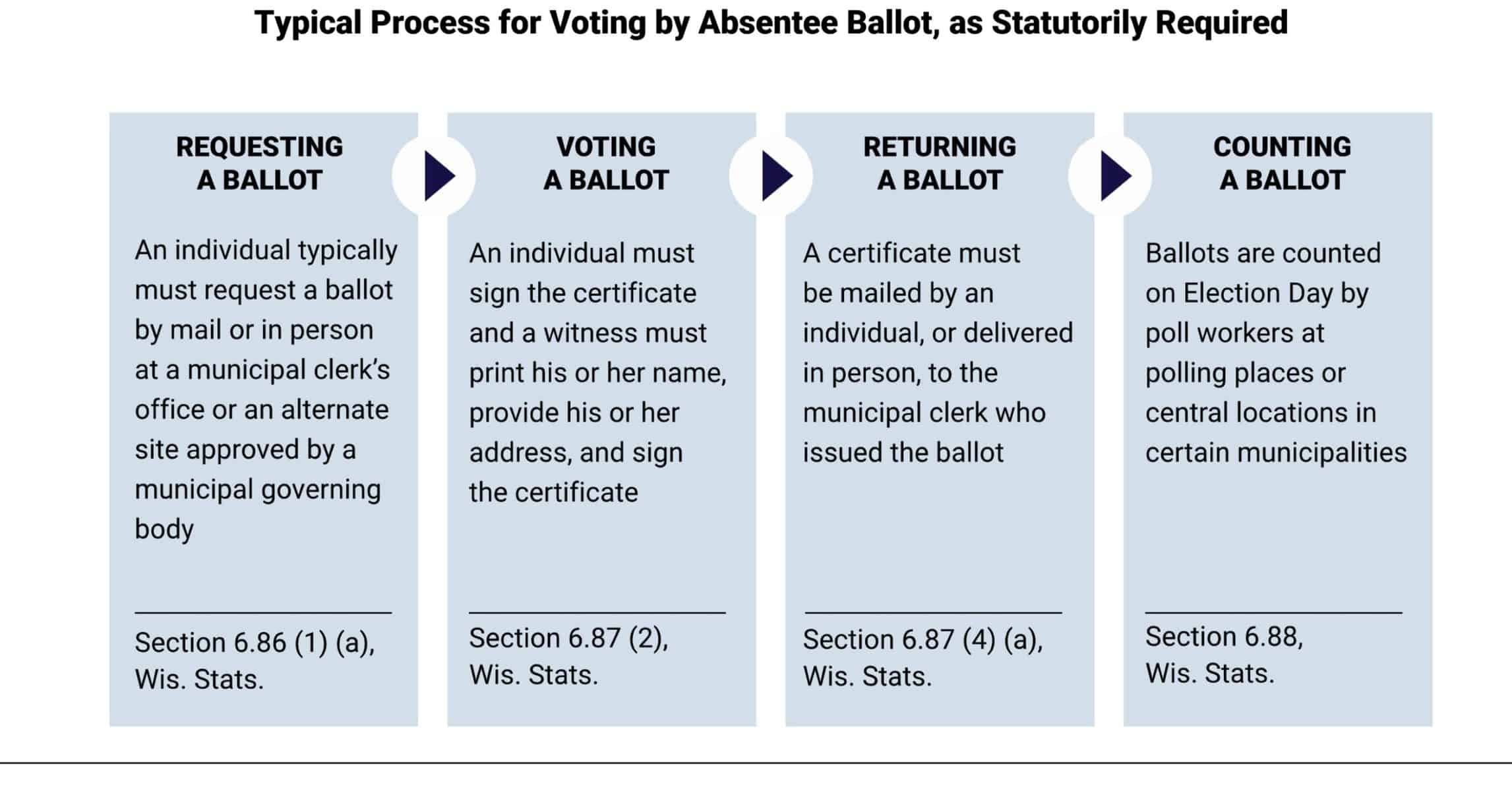
More than 7 percent of absentee ballots reviewed in the major non-partisan audit lacked legally required information, such as addresses, witness and voter signatures, during the November 2020 presidential election in Wisconsin. Although auditors only reviewed a sample of just over 14,700 ballots, if you extrapolate the percentage to the entire pool of 1,963,954 absentee ballots cast, you would get a potential 137,400 ballots that were incomplete. However, most of those were partial addresses, and, although state law requires addresses on absentee ballot certificates, it does not specify which elements of an address must be included. Thus, it comes down to the interpretation of what constitutes an “address.”
The number of absentee ballots jumped from 27.3 percent of all ballots cast in November 2016 to 59.6 percent in 2020.
Not many were cured. “Our review of the 14,710 certificates found evidence that municipal clerks had corrected witness addresses on 66 certificates (0.4 percent),” auditors noted.
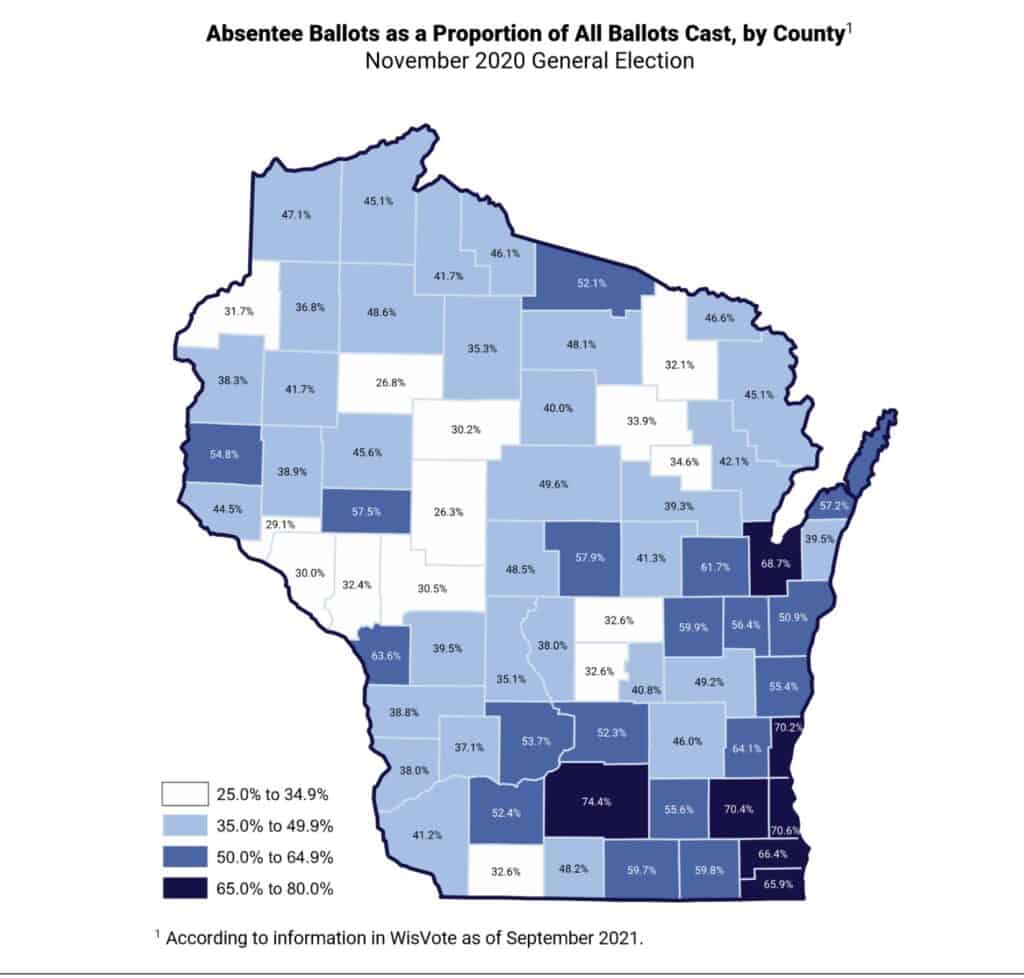
Democratic counties had a much larger percentage of people voting absentee. As WRN previously broke, in some cities (such as Green Bay), liberal consultants funded by Facebook and other liberal entities were giving clerks advice on things like ballot curing.
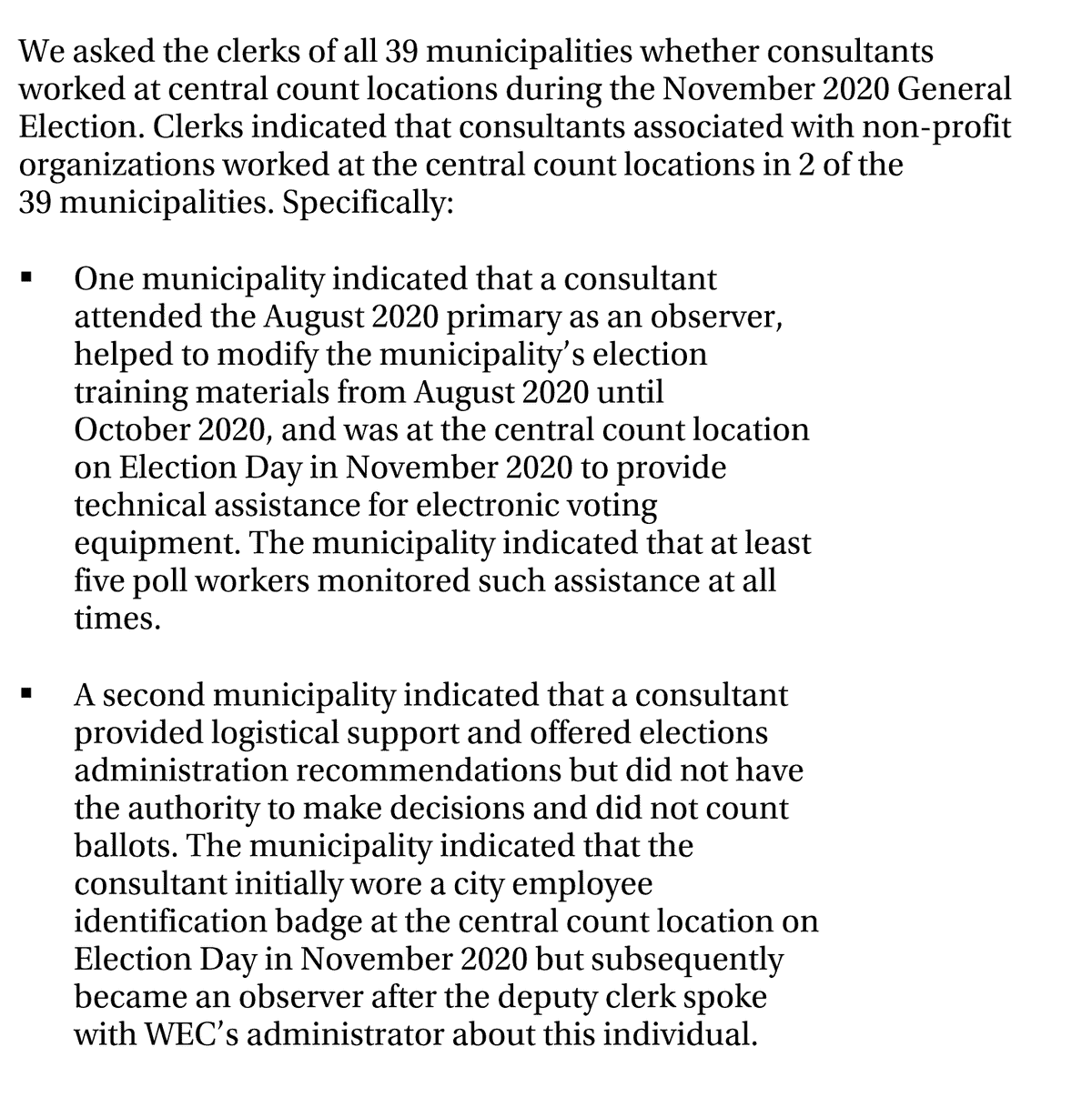
There were problems in how absentee ballot voters’ identities were verified.
“Statutes do not require municipal clerks to verify the signatures of individuals who cast absentee ballots. We reviewed information from 30 states where election officials verify signatures and found that ballot signatures are compared to signatures on other documents, such as absentee ballot applications, voter registration forms, and driver’s licenses,” auditors found.
The auditors also looked at indefinitely confined voters who don’t need photo ID to get absentee ballots.
“In March 2020, WEC provided guidance to municipal clerks indicating that indefinitely confined designations are determined by individuals and are based on their circumstances, do not require permanent or total inability to travel outside of the home, and should not be used in order to avoid providing photo identification for voting. On December 14, 2020, the Wisconsin Supreme Court ruled that individuals must decide, based on their age, physical illness, or infirmity, whether they are indefinitely confined.”
There was an explosion in indefinitely confined voters. Only nine other states allow this, and some require physicians to certify that a person truly is indefinitely confined.
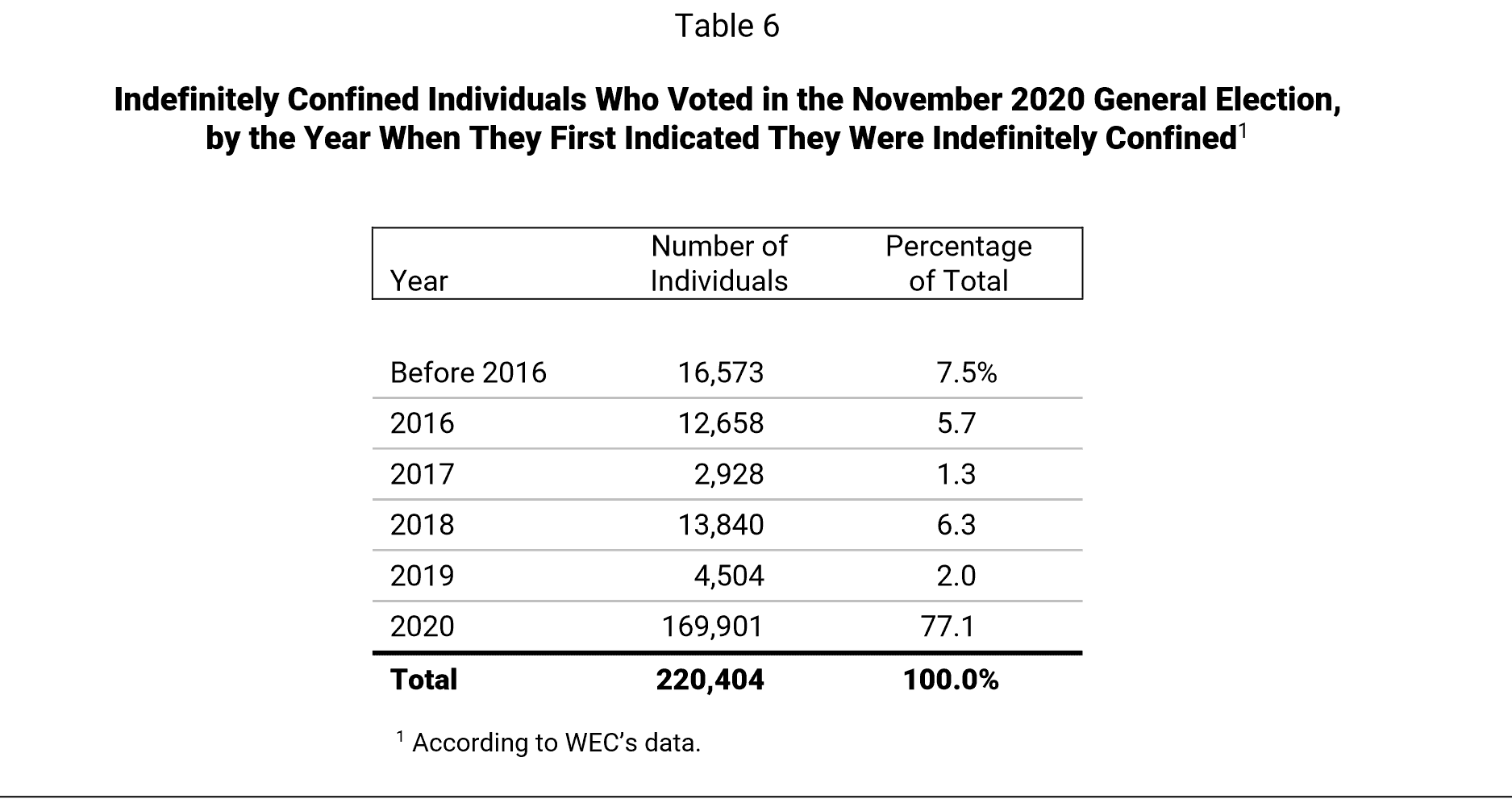
The board notes, “Statutes allow individuals to sign statements indicating they are indefinitely confined because of age, physical illness, or infirmity, or because they are disabled for an indefinite period.”
Soaring Costs to Request a Recount
Milwaukee and Dane Counties charged wildly higher amounts for recounts than they had in 2016, the auditors found.
Municipal Clerks Violating the Law
The audit lists numerous ways that municipal clerks violated the law. Some examples:
State law requires clerks to sign Election Day forms indicating they certify the integrity of the seals. 12.9 percent of forms did not include all expected initials, “which may indicate that the poll workers found problems with the seals or forgot to initial the forms,” auditors found.
State law requires municipal clerks to write their initials on (absentee ballot) certificates in certain situations, “including when individuals request absentee ballots in person at clerk offices, and statutes indicate that a ballot must not be counted if such a certificate is not initialed. We found that less than 1.0 percent of all certificates we reviewed in four municipalities contained clerk initials,” a non-partisan Legislative Audit Bureau report found.
Auditors noted: “We question whether the clerks in these four municipalities consistently complied with the statutory requirement for them to initial certificates in certain situations….If WEC believes municipal clerks should be permitted to correct or add missing witness address information to certificates, WEC’s staff should work with WEC to promulgate administrative rules to permit clerks to take such actions.”
Auditors asked clerks why ballots weren’t initialed. “Clerks at these municipalities indicated that they did not initial certificates for multiple reasons, including because the individuals who requested the ballots were registered and eligible to receive them; the clerks printed the names and addresses of the individuals on the certificates to signify the individuals were eligible to receive the ballots; and the clerks initialed the ballots rather than the certificates. We question whether the clerks in these four municipalities consistently complied with the statutory requirement for them to initial certificates in certain situations,” they wrote.
Botched Scrutiny of Voter Registration Lists

Auditors believe four people voted twice in the presidential election. Twenty-four people had two active voter registrations.
In addition, clerks were supposed to deactivate the registrations of 33,473 deceased people and 2,256 people serving felony sentences. “As of June 2021, clerks had either inactivated the voter registration records or allowed the records to remain active for all but eight individuals associated with potential matches based on information from DHS. As of September 2021, clerks had done so for one individual associated with potential matches based on information from DOC,” auditors found. “If an individual submits an absentee ballot but dies before Election Day, statutes require that the absentee ballot not be counted if local election officials are aware of the death.” The auditors found that “The available information indicates that 11 individuals who died before November 3, 2020, likely voted in the General Election.”
As for felons voting illegally, “We found that the available data indicate that eight individuals with ongoing felony sentences may have voted in the November 2020 General Election,” auditors found.
“… the data do not indicate precisely why the non-match occurred because DOT does not provide WEC with any personally identifiable information. As a result, clerks are uncertain whether a non-match occurred because of only a slight difference in a given individual’s name, which may indicate little cause for concern, or a significant difference, which may indicate that an individual is
attempting to register to vote by using another individual’s information,” auditors wrote.
What happens to non-matches? “Statutes do not require clerks to inactivate the voter registration records of these individuals, who remain eligible to vote,” auditors wrote, indicating that one clerk indicated not having time to review non-matches and another wasn’t aware of the need to do so.
Lack of Training of Municipal Clerks
State law requires that municipal clerks be trained. “For the two-year period that ended in December 2019, 82.5 percent of municipal clerks reported having completed all required training,” auditors wrote.
Furthermore, the audit notes, “WEC’s administrative rules require WEC to notify the governing body of a given municipality if a municipal clerk does not complete the statutorily required training. WEC’s staff indicated that they did not contact any governing bodies if clerks did not report having completed required training for the two-year period that ended in December 2019. Instead, WEC’s staff indicated that they contacted clerks and attempted to elicit their cooperation in completing and reporting the training.”
The auditors noted, “We found that WEC’s administrative rules for training municipal clerks have not been updated since June 2016 and contain outdated provisions.”
Use of Drop Boxes & Scrutiny of Electronic Voting Machines
One area that lacks clarity in state law: Dropboxes. “Statutes require a certificate to be mailed by the individual, or delivered in person, to the municipal clerk who issued the ballot. Statutes do not permit or prohibit ballot drop boxes. In March 2020, WEC’s staff issued written guidance indicating that municipal clerks can allow individuals to return absentee ballots to drop boxes. In response to our survey, 245 municipal clerks (28.7 percent of 855 clerks that responded to our survey) indicated that they used ballot drop boxes for the November 2020 General Election,” the audit found. South Central Wisconsin communities were more likely to use dropboxes than other areas of the state.
Auditors noted, though, that there is legal disagreement over whether statutes allow dropboxes.
Information from the National Conference of State Legislatures (NCSL) “indicates that 11 states, which are listed in Appendix 9, allowed drop boxes as of September 2020. In June 2021, a law firm asked the Waukesha County Circuit Court for a declaratory judgment that
statutes do not allow drop boxes. As of September 2021, the court had not issued its decision. If WEC believes that municipal clerks should be permitted to establish drop boxes where individuals can return absentee ballots, WEC’s staff should work with WEC to promulgate administrative rules to permit clerks to establish them.”
What about electronic voting machines? “Our review of 175 pre-election test results in 25 municipalities found that clerks conducted 50.3 percent of the tests within 10 days before the November 2020 General Election, as required by statutes. We found that 59 of 60 test results we reviewed in greater detail indicated that the equipment had accurately counted the votes for presidential candidates. One test result included insufficient documentation, which prevented us from making a determination,” the auditors found.


